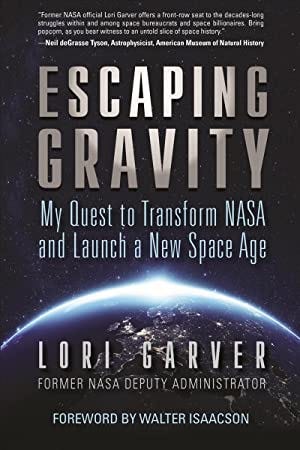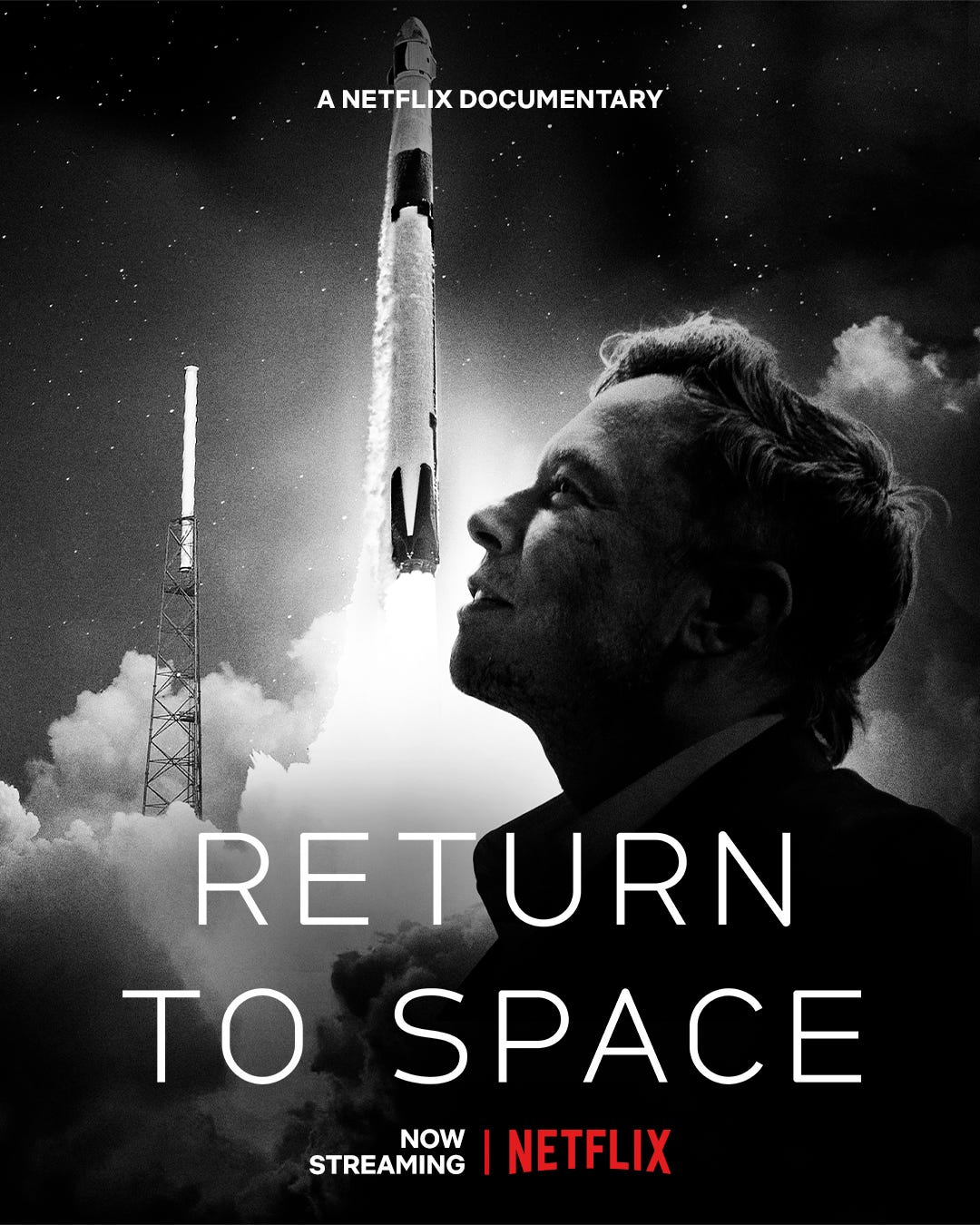Almost 50 years ago, in December 1972, the Apollo 17 astronauts splashed down in the Pacific Ocean, marking the end of the Apollo program. In the half-century since, no crewed mission — not Americans nor anyone else — has ventured beyond low Earth orbit. Despite a series of presidential promises, NASA has yet to return to the Moon, let alone venture to Mars. And despite recent declines in launch costs, thanks in large part to SpaceX, NASA remains in many ways committed to the old, Apollo-style way of doing things. To learn more about why NASA's manned missions always seem to run over budget and behind schedule — and to get a sense of the way forward with commercial space companies — I'm speaking with Lori Garver.
Garver was previously Deputy Administrator of NASA during the Obama administration, from 2009 to 2013. Previously, she worked at NASA from 1996 to 2001 as a senior policy analyst. Garver is the founder of Earthrise Alliance, an initiative to better use space data to address climate change. She also appears in the 2022 Netflix documentary Return to Space. Her fascinating memoir, published in June, is Escaping Gravity: My Quest to Transform NASA and Launch a New Space Age. Below is an edited transcript of our conversation.
James Pethokoukis: In December of this year, it will mark the 50th anniversary of the Apollo 17 splashdown and the end of the Apollo program. Humanity has been stuck in low Earth orbit ever since. And for a while, the United States couldn't even get to low Earth orbit on its own. What happened to all the dreams that people had in the ‘60s that just sort of disappeared in 1972?
Lori Garver: I think the dreamers are still out there. Many of them work on the space program. Many of them have contributed to the programs that we had post-Apollo. The human space flight program ended and took that hiatus. [But] we’ve been having, in the United States a very robust and leading space program ever since Apollo. For human space flight, I think we got off track, as I outline in my book, by really trying to relive Apollo. And trying to fulfill the institutions and congressional mandates that were created for Apollo, which were too expensive to continue with more limited goals. The Nixon administration actually had the right idea with the Space Shuttle. They said the goal was to reduce the cost of getting to and from space.
Money was no object for a while.
When you have your program tied to a national goal, like we did in Apollo of beating the Russians and showing that a democratic system was a better way to advance society and technology and science, we built to a standard that tripled the budget every couple years in the early days. We [NASA] then had to survive on a budget about half the size of the peak during Apollo and have never been able to really readjust the infrastructure and the cost to sustain it. So I'd say our buying power was greatly reduced.
We'll talk about government later in the interview, but to some degree, isn't this a failure of society? If politicians had sensed a yearning desire from the American public to continue moving out further in space, would we have done it?
It's hard to know how we measure public support for something like that because there's no voting on it per se. And there are so few congressional districts whose members are really focused on it. So the bills that come up in Congress are funding bills. NASA is buried among many other agencies. And so I think the yearning on the part of the public is a little more diffuse. What we want to see is the United States being a leader. We want to see us doing things that return to our economy, and we want to see things that help our national security. Those are the ways space contributes to society. And I think what we got off track in doing is delivering hardware that was built in certain people's districts instead of being a purpose-driven program as it was in Apollo.
Even though the Space Shuttle wasn't going to fly to the Moon, people were really pretty excited by it. I'm not sure polls always capture how interested people are in space.
We don't really gauge based on people who are attending launches. As someone who's been to a lot of launches, there are lots of people enthused. But that's not 300 million people in the country. I think that polls tend to show, as compared to what? And NASA tends to be at the bottom of a list of national priorities. But, of course, its budget isn't very large. So these are all things that we try to evaluate. I think if you believe that network news was able to track public interest, by the time of the Challenger accident — which was only the 25th shuttle launch — they weren't showing them live anymore. So that's the kind of thing that you can look into. We really like things the first time. And those first couple missions were very exciting. Or if we did something unique, like fix the Hubble Space Telescope, that was interesting. But we had 134 missions, and not every one of those got a lot of publicity.
I saw you in the fantastic Return to Space documentary, and you had a great statistic saying that basically it cost about a billion dollars for every astronaut that we sent to space. Was there just fundamentally not an interest in reducing that cost? Did we not know how to do it? Was it just how government contracts [worked]? Why did it stay so expensive for so long?
A combination of all those things plays into it. It's about the incentives. These were government cost-plus contracts that incentivize you to take longer and spend more, because you get more money the longer it takes. If you’ve worked in any private sector, they want to expand their own profits. And that's understandable. The government wasn't a smart buyer. And we also really like to focus on maybe doing something exquisite or a new technology instead of reducing the cost. [It’s a] really interesting comparison to the Russian program where they just kept doing the same thing and it costs a little less. The Space Shuttle, we wanted it to be reusable. But it cost as much to refurbish it as it would have to rebuild. It wasn't until recently that we've had these incentives reversed and said, “We will buy launches from the private sector, and therefore they have the incentive to go and reduce the cost.” That's really what's working.
If you look at what presidents were saying, they certainly still seem to be interested. We had the George H.W. Bush administration: He announced a big plan to return us to the Moon and Mars. I think it was like about a $500 billion plan. What happened to that? That was the Space Exploration Initiative?
SEI, yes. I go into this in the book because, to me, it is really important that we not forget how many times presidents have given us similar goals. Because you come in, and I was the lead on the Obama transition for NASA. I was outgoing in the Clinton administration for NASA, leading the policy office, and supported lots of those Republican presidents in between in their space proposals. Never met a president who didn't love NASA and the human space flight program. They have various levels of success in getting what they want achieved. I think the first President Bush tried very hard to reduce the cost and to be more innovative. But the NASA bureaucracy fought him on that quite vociferously.
Why would they? Wouldn’t they see that it would be in NASA's long-term interest for these missions to be cheaper, more affordable?
It was not dissimilar to my time at NASA in that the administrator was a former astronaut. And they didn't really come there with a mandate to do much other than support the existing program and people at the agency. When you're at NASA and you just want to do the same thing, you don't want to take a risk to change what you're doing. You want to keep flying your friends, and you have really come to this position because other people did the same thing as well. I call it, in the book, the “giant, self-licking ice-cream cone,” because it's this sugar high that everyone in it has. But it doesn't allow for as much progress.
So no one anywhere really had an incentive to focus on efficiency and cost control. The people in Congress who were super interested, I imagine, were mostly people who had facilities in their districts and they viewed it as a jobs program.
Yes. And they want contracts going to those jobs. Really, the administration, the president, is the one who tends to want a more valuable, efficient, effective space program. And within this, throughout the last decades, they've had a bit of tension with their own heads of NASA to get them to be more efficient Because Congress wants more of these cost-plus contracts in their district, the industry likes making the money, and the people at NASA tend to say, “Well, I might be going to work in one of those industry jobs down the road. So why do I want to make them mad?”
It's really a fairly familiar story, despite sort of the interesting, exotic nature of space. It could be … banking and financial regulation, where you have the sort of a revolving door…
That's what's difficult. And for me, I think writing the book was challenging for some of the people within the program to have this out there, because NASA is seen as above all that. And we should be above all that. What’s a little ironic is to the extent that we're above all that, it's because we've now finally gotten to a point where there are some private-sector initiatives and there's more of a business case to be made for human space flight. Whereas previously, it was just the government so the only reason was this self-licking ice-cream cone.
So we had the first Bush administration, they had this big, expansive idea. Then … canceled— right? —by President Clinton?
Really by Congress. Congress did not fund president H.W. Bush's Space Exploration Initiative. But the tension was between what his space council wanted to do — which was led by Vice President Quayle — and what NASA wanted to do. A couple years in, he fired his head of NASA, brought in someone new, Dan Goldin. Dan Goldin was the head of NASA then for 10 years. The Clinton administration kept him, and the second Bush administration kept him for the first year. He drove a lot of this change. And as I talk about in the book, I worked there under him and eventually was his head of policy. And really, he was trying to infuse these incentives well before we were successful in doing this with SpaceX.
So then we had the second Bush presidency, and we had another big idea for space. What was that idea, and what happened to that?
We had the Columbia accident, which caused the second President Bush to have to look at human space flight again and say, "You know, we need to retire the shuttle and set our sights, again, farther." And this was the Moon-Mars initiative, it was referred to as the Vision for Space Exploration. Again, we had a change of NASA administrator under him. And I truly believe if you look, the changes aren't as much driven by presidents as they are heads of NASA. So it's who do you appoint and how long do they last? Because President Bush, it changed with his second administrator to be this program called Constellation, which was a big rocket to take us back to the Moon. Government owned and operated.
So we were talking about how the legacy of Apollo has just loomed large over the program for decades. And this is another good example of that?
This was referred to as “Apollo on steroids.” That is what the head of NASA wanted to do, and for a lot of good reasons, including because he knew he could get the congressional support for the districts, for the contracts that were typical for the time. You could use the NASA centers that already existed. This was never going to be efficient. But this was going to get a budget passed.
Was there a real expectation that this would work? Or was this fundamentally a way of propping up this sort of industrial jobs complex infrastructure?
I struggle with this question because I believe that the people creating these programs are very smart and are aware that when they say they're going to be able to do something for this amount of money and so forth, they know they can't. But they clearly feel it's the right thing to do anyway, because if they can get the camel's nose under the tent, they can continue to spend more money and do it.
“Let’s just keep it going, keep the momentum going.”
Yes.
When did we decide that just kind of redoing Apollo wasn't going to work and we need to do something different and we need to try to bring in the commercial [sector]?
I take it back to the 1990s under Dan Goldin. As head of NASA, he started a program that was a partnership with industry. It was going to be a demonstration of a single-stage reusable launch system. Lockheed Martin happened to win it. It was called the X-33. They planned to develop a fully reusable vehicle that would be called VentureStar, but it ran into technical problems. They were trying to push doing more. And the Space Shuttle was still flying, so there weren't these incentives to keep it going. They canceled the program. Lockheed wasn't going to pick it up. The dot-com bubble burst. The whole satellite market that was going to be where they got most of their money — because the premise is “NASA just wants to be one customer, not pay for the whole system.” So really, the second Bush administration in the same post-Shuttle Columbia accident policy initiative said, “We are going to …” — again, very consistent with previous presidents, but again said — “… use the private sector to help commercialize and lower costs.” And the first Bush administration did that with a program — not for people, but for cargo — to the International Space Station. SpaceX won one of those contracts in 2006. So when I came back in 2008, and then 2009 with our first budget request, we asked for money for the crew element, meaning taking astronauts to the space station to also be done privately. Most people hated that idea at first.
I've seen a video of a hearing, and a lot of senators did not like this idea. Apollo astronauts did not like this idea. Why did people not like this idea?
Well, let's see: There were tens of billions of dollars of contracts already let to Constellation contractors. And this meant canceling Constellation. Because the first part of that, although it was designed (at least in theory) to go back to the Moon, it was going to take us to and from the space station. But the program in the first four years, had slipped [to] five years. It was costing a couple billion dollars a year. And again, we're still sort of doing that program. And maybe we'll get to that.
I don't think it ever really goes away.
The Commercial Crew Program, we were able to carve out enough dollars to get it started. And this was not something that was easy. It was not something I think most people in the Senate, or the former Apollo astronauts who testified against us, thought was possible. I think there was just this sense — and again, Elon and SpaceX was very, very likely to be the winners of these competitions. People just didn't believe he could do it.
They thought only government could do something this spectacular. Elon Musk encountered a lot of skepticism from astronauts. And he found this personally and emotionally really hurtful, to see these astronauts be skeptical. To be charitable, they were skeptical.
I did too. I knew them, and I knew that they thought the policies I was driving were wrongheaded. Gene Cernan said it would lead to the end of America as we know it, the future of his grandchildren were at stake. So these were not easy things to hear. And I'm often asked, why did I even believe it would work? Well, let's face it, nothing else had worked. It had been 50 years since Apollo! And we hadn't done it, as you said in the opening of the program. We also know that in every other aspect of transportation or large initiatives that the government takes on, the idea isn't to have the government own and operate them. We didn't do that with the airlines. So this was inevitable, and the private sector was launching to space. They had been since the ’90s. We had turned over management of the rocket systems. So I didn't necessarily know SpaceX was going to make it, but I knew that was the way to drive innovation, to get the cost down, and to get us to a place where we could break out of this giant, self licking ice-cream cone.
But now we have a system that's sort of betwixt and between. The next sort of big thing is this moon mission, Artemis, that is a little bit of the old way and a little bit of the new way. We're going to be using a traditional Apollo-style developed rocket, the SLS. I think a SpaceX lander. Why aren't we going to launch this on a very big SpaceX rocket? Why are we still doing it a little bit of the old way?
Because I failed, basically. This grand bargain that we made with Congress, where we got just enough money to start a commercial crew program, kept the contracts for Constellation.
SLS is Constellation, for the listeners.
It is. It’s the same. They protected the contracts and the rocket changed a little bit, but the parts — again, the money; follow the money — all are still flowing to Lockheed, Boeing, Aerojet. The Space Launch System is often called the “Senate Launch System.” I don't happen to agree, because it wasn't just the Senate that did this. The call, as I say, was coming from inside the house: NASA people wanted to build and operate a big rocket. That's why they came to NASA. They grew up seeing Apollo. They wanted to launch their version of the Saturn V. And they ultimately were willing to give up low Earth orbit to the private sector, if they could have their big rocket. So that's back in 2011 that this is established, this bifurcated system. They were supposed to launch by 2016. It's now 2022. They haven't even launched a first test flight. This first test flight, now at $20 billion-plus — the capsule on top, called Orion, is exactly from Constellation, so it's been being funded at more than a billion a year since 2006. This is not a program that should be going forward, and we are about to do a big test of it, whether it works or not. We'll have a bigger decision, I think, when it's over if it's successful than if it's not. I think if it's not successful, we ought to just call it.
Even if it's successful, is this the last gasp of this kind of manned space exploration? I mean, even if we get to the Moon by … when? I'm not sure when the current moving target is.
Well, I believe we're continuing to say now, 2025, the current NASA administrator.
Any program that expensive is not going be sustainable, even if it should work technically.
This is my view. This is the whole premise of Escaping Gravity, is we have to get out of not just our gravity well of Earth, but the system that has been holding us back. And I'd love to say it's the last gasp, but I thought that about Constellation. And it should have been true about the shuttle.
Can you give me a sense of the cost difference we’re talking about?
The Space Launch System with Orion, which is the rocket and capsule, together have cost us over $40 billion to develop. Each launch will also cost an additional $4 billion, and we can only launch it once every two years. So in Apollo, we launched I think 12 times in five years, once we started the program. If we start now with the program, in next five years the most we can launch is three times. This is not progress. And those amounts of money, compared to the private sector… It hasn't launched something bigger than SLS yet, but let's just take the Falcon Heavy, which launches about 80 percent of the size of payload that the SLS can. SpaceX developed that without any public money. And the per launch costs are in the $100-150 million range. It's just not comparable.
Does the current head of NASA understand these cost calculations?
Well, he recently said — Administrator Bill Nelson, former Florida senator — that he thinks that this cost-plus system that NASA has been using is a “plague” on the agency. So this is fascinating, because he's basically patient zero. He required us to do the SLS. He's very proud of that to this day. So he can brag about the monster rocket, he calls it that, and yet still say the way we are doing it is a plague. So you'd think he doesn't want to do things this way anymore. And as you said, SpaceX is developing the lander for the Moon program. So it's really hard to know what the outcome will be because, like you, I don't believe it's sustainable to spend so much for something we did 50 years ago that isn't going to be reusable, the costs aren't coming down, we aren't going to be able to do it more often. All the things that mean “sustainable.” But yet, that is the government's plan.
It just seems hard to believe that that plan is not just sustainable to go to the Moon and develop a permanent moon facility … and then to Mars, which obviously is going to cost even more. It seems like, if as a country we decide this is something we want to do, that inevitably it's going to be a private-sector effort.
You know, it's really related to, as a country deciding what we're going to do. Because if there was some compelling reason, as there was in the ‘60s, the nation's leaders felt to go to the Moon for the first time. If that came together for Mars, maybe the public would be willing to spend trillions. But if you can reduce the cost through the private-sector use of vehicles, you can still advance US goals. I try to make the case. This isn't an either/or. This can be a NASA-led and industry-developed program, just as we have done with so much of our economy. And to me, that is inevitable. It's just, how much are we going to waste in the meantime?
Is the threat of China enough of a catalyst to give more momentum toward American efforts in space?
China is certainly a threat to the United States in many ways — economically, politically, and so forth — and therefore, I think, seen as a big reason for us to return to the Moon. (We say it's a race with China. I'm like, “Okay, for the 13th person. Because don't forget, we won.”) But doing that in a way that drives technology and leaves behind a better nation, that's how you win in these geopolitical races. And so to me, yes, we are making the case (I think NASA, in particular) that we need to beat China, in our case, back to the Moon. It's about leadership. And I don't think we lead or help our nation by protecting industries that then aren't competitive. I still see the need to evolve from the system, and I fully believe we will be back on the Moon before the Chinese. But they are someone we have our eye on. They are really the only other nation right now with an advanced human space flight program.
One of my favorite TV shows, which I probably write too often about, is the Ronald D. Moore show For All Mankind. And for listeners who don't know, the premise is that the space race never ends because the Soviets get there first. They beat us to the Moon, and then we decide that we’re going to keep going. And the race just keeps going through the ‘60s, the ‘70s, and the ‘80s. I'm sure somewhere in NASA there were great plans that after Apollo we were going to be on the Moon. … Can you imagine a scenario where all those plans came true? Was it inevitable that we were going to pull back? Or could we at this point already have Mars colonies or Moon colonies? That the wildest dreams of the people in the ‘60s, that we actually could have done it, there was a path forward?
Of course. I could be on a much longer show about For All Mankind, because I, too, am really invested in it.
We did a great podcast with Ronald D. Moore.
Oh good. I know of the astronauts who advise. And of course, I find it hilarious what they take out of it. And the astronauts' perspective about how things are actually run in Washington is just hilarious. And one of the reasons I wrote Escaping Gravity, all astronauts should understand that presidents don't sit there at their desk, wondering what NASA's doing today.
If I was president, I would be wondering that.
And they have, of course, a former astronaut becoming the president. They want it to go well. Like I said, all presidents love it. But of course NASA's plan, and really from von Braun, was Moon on the way to Mars and beyond. Science fiction really wrote this story. And I think people who were drawn to NASA are all about trying to make that a reality. And in many ways we're doing it.
What would things look like right now without SpaceX? I’m sure you know that SpaceX, as well as Blue Origin, there's a certain criticism that this is some sort of vanity effort by billionaires to take us to space. But I'm assuming that you don't view this whole effort as a vanity effort.
Yes. My book is called Escaping Gravity: My Quest to Transform NASA and Launch a New Space Age. And I'm very clear in it that there wouldn't be much transformation going on without SpaceX. So yes, they are absolutely critical to this story. It would've taken longer without them. We don't even have Boeing, their second competitor, taking astronauts yet to the station. But we would've had competitors. There were people before Elon. I think Bezos, and Blue Origin, is making progress and will do so. There are other companies now online, the Dream Chaser, to take cargo to the space station, private sector. But make no mistake, without them, without Elon and his vision and his billions, Artemis wouldn't be even more than a great name for a human space flight program. Because we didn't have the money for a lunar lander that anyone else bid, except for SpaceX. They have overachieved. They have set the bar and then cleared it. And every time they compete, they end up getting less money than the competition and then they beat them. So it's impossible, really, to overstate their value. But I still believe that the policies are the right ones to incentivize others in addition to SpaceX. And if they weren't here, we would not be as far along for sure.
I am now going to ask you to overstate something. Give me your expansive view of what a new space age looks like. Is it just humans going out into deep space? Is it a vibrant orbital space economy? What does that new space age look like?
To me, it is a purpose-driven space age so we are utilizing fully that sphere beyond our atmosphere. So that's in lower Earth orbit, using that to help society today, we can measure greenhouse gases in real time, the emissions. We can, as we look forward, go beyond certainly Mars, to places where humanity must go if we want to be sustained as a species. I think the purpose of space is like saying, “What was the purpose of first going into the oceans?” It's for science. It's for economic gain. It's for national security. Similar to the atmosphere and now space. It's a new venue where we all can only just imagine what is possible today, and it we will be there. I personally like that Jetsons future of living in a world where I have a flying car on another planet.
Lori, thanks for coming on the podcast.
Thank you for having me.
















